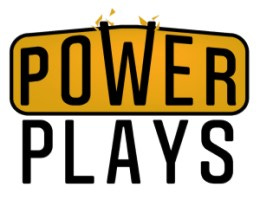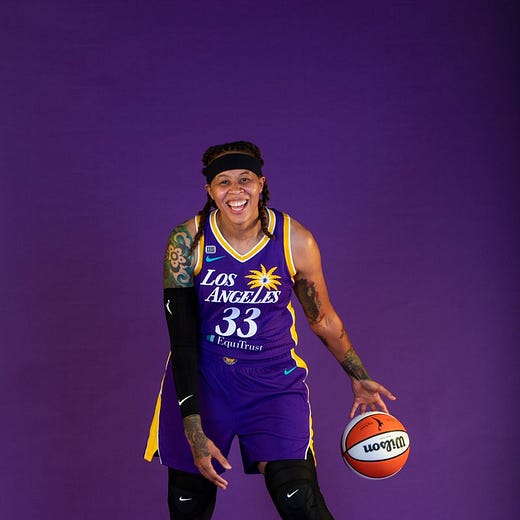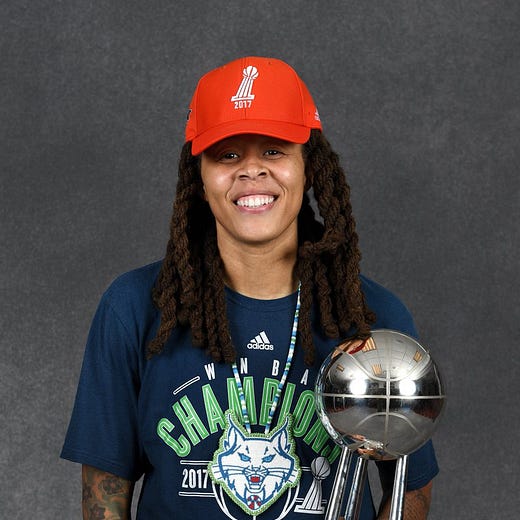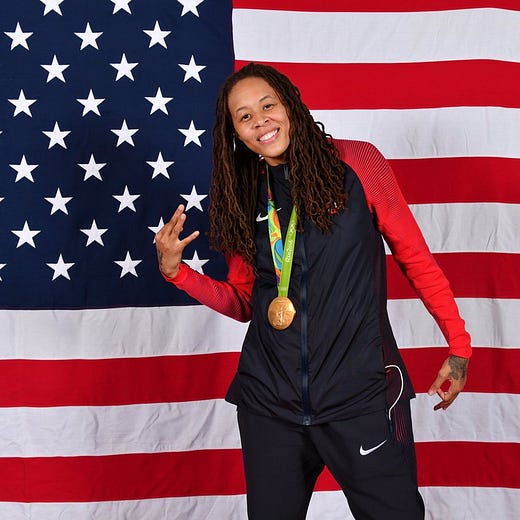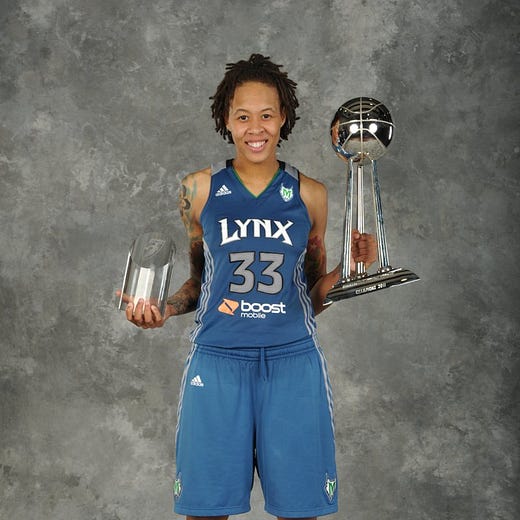Meet the Wojs of the WNBA
The inside scoop on the insiders with the scoops.
IMPORTANT NOTE BEFORE I GO ANY FURTHER: I am getting a message that this post is “too long for email,” so if you’re reading this from your inbox, you probably want to click this link and read it on the web instead.
Hello, friends! Today, as many of you know, is the first official day of WNBA Free Agency, and it has been full of drama. But you can go elsewhere to read about the actual transactions. Here at Power Plays, as part of our #CoveringtheCoverage series, I want to focus in on the news breakers.
If you’ve been anywhere on the internet in the past 15 years, you probably have heard of the phrase #WojBomb, which refers to NBA breaking news nuggets reported by ESPN’s Adrian Wojnarowski. Whether it be free-agency signings or trades, injury news or coaching hires, Wojnarowski is usually the first to alert the world with a tweet — though sometimes he does get beaten out by competitors such as Shams Charania with The Athletic and Chris Haynes at Yahoo Sports.
Even if you’re not a die-hard NBA fan, following the flurry of activity and rumors and player movement can be enthralling and even invigorating, and such reporting generates massive buzz for the league.
Until recently, there was *very, very, very* little of this reporting happening in the WNBA. You’d find out the moves when teams announced them, and you’d rarely get any information on salary or contract length or what other options the players had. I’m not saying no reporters were covering such things — there are always exceptions to rules — but it was far from the norm.
But things are changing. One of the first big moments that I can recall signifying the modernization of WNBA reporting was when Howard Megdal, at the end of 2016, reported that Elena Delle Donne did not want to play for the Chicago Sky anymore, and wanted to force a trade. A couple of years later, Rachel Galligan sent the WNBA world into a frenzy when she broke the news that Liz Cambage wanted to be traded away from the Dallas Wings. Nowadays twitter is teeming with WNBA news around the clock, especially during free agency season. It’s an absolute blast to follow, and I truly believe this reporting has been a vital part of growing the popularity of the league.
For this newsletter, I interviewed three of the reporters who dominate WNBA breaking news: Galligan, Megdal, and Khristina Williams. They talked to me about how they got started in the breaking news space, the challenges of their work, and even how they support themselves considering none of them are being paid Woj money to do this as a full-time job. They were extremely candid and passionate, and I think you’re going to really enjoy finding out more about them.
I do want to stress that they are *not* the only reporters doing this work, and I plan to keep highlighting the work of women’s sports reporters from all around the media sphere this year in #CoveringtheCoverage. For now, here are a few other news breakers to follow: Ari Chambers at HighlightHer; Alexa Philippou of the Harford Courant; Annie Costabile for the Chicago Sun Times; Chantel Jennings at The Athletic; Kareem Copeland of the Washington Post; and Holly Rowe at ESPN. Please use the comment section to add any others, the knowledge that I would inevitably exclude phenomenal reporters almost kept me from posting this at all.
And remember, Power Plays is only possible because of the support of paid subscribers. So please sign up, purchase a subscription if it’s feasible for you to do so right now, and share this post if you enjoy it. Thank you!
Okay, friends. Let’s do this.
Meet our Wojs:
Rachel Galligan
Analyst at Just Women’s Sports and Winsidr
Follow her on Twitter @RachGall. Read her writing at Just Women’s Sports. Listen and subscribe to the Winsidr podcast.
Howard Megdal
Editor/Founder of The IX and The Next; Freelancer at FiveThirtyEight, Washington Post, and Forbes
Follow him on Twitter @howardmegdal. Subscribe to The Next for 24/7 women’s basketball coverage. Subscribe to The IX for curated women’s sports links.
Khristina Williams
Founder of GirlsTalkSportsTV and Spotify Greenroom host
Follow her on Twitter @Khristina. Follow GirlsTalkSportsTV on Instagram. Tune into her weekly show on Spotify Greenroom.
A Power Plays Q&A with Rachel Galligan, Howard Megdal, and Khristina Williams
On Monday, during a very newsy day in free agency, Galligan, Megdal, and Williams all took time out of their busy schedules to talk with me on the phone. While I interviewed them all individually, I asked each of them the same six questions, so I’m going to present their answers in a roundtable style. The interviews have been edited for length and clarity.
(I’ve peppered in some of their breaking news tweets AND some of the coverage their news breaking has inspired from other outlets. I don’t know why I feel the need to explain that decision, but here we are.)
Power Plays: How did you get started reporting on women’s basketball?
Rachel Galligan: I have a very bizarre journey to this point. I coached college basketball for many years, and I played before that. But when I decided to get out of coaching and start my business, I was looking for ways to stay involved in the game. I reached out to this company I saw on Twitter called HERO Sports with my resume, just saying that I loved talking about women’s basketball and to let me know if they needed anyone. They reached out a few weeks later and asked if I would write about women’s college basketball. That was kind-of how I got my foot in the door. That same year, I started working with Winsidr, doing the podcast that I still do. And you know, it's just been a snowball effect for like the last five years.
Howard Megdal: I've been a sportswriter for most of the past 15 years, and I would find myself with opportunities to cover women's basketball and other women's sports, and every time I did there was just this flashing neon sign showing how little was being done compared to the men's sports I was covering. The nexus point of it for me was the fall of 2015 when I was covering the World Series, and I was also covering the WNBA playoffs. I was at the World Series at Citi Field, and when [Mets third baseman] David Wright was at his locker [during media availability], he was surrounded by about 50 reporters. Then I went to cover what was a deciding playoff game at Madison Square Garden involving Tamika Catchings, the best player in the history of the WNBA. And when I went to interview Catchings it was just me and a couple of videographers from the league. I wrote a story about what was one of the greatest Tamika Catchings performances there ever was — she managed to lift an Indiana Fever team that was a big underdog to a victory over the New York Liberty. I take no pleasure in saying this, but if I hadn’t been there, no one would have really documented it.
I came home that night and I remember just saying myself, “If the greatest player in the history of the league winning in the world's most famous arena is not getting coverage, how many other stories are falling through the cracks?” I said to myself that day, “I'm going to make sure that first and foremost I am covering women's basketball and women's sports, and then I will fit in men's sports around it, instead of the other way around.”
Khristina Williams: I started to report on women's basketball in 2018 after I started my social digital platform GirlsTalkSportsTV. Sports have always been a part of my life, and so when I started in 2018 it was really because I wanted to provide equitable media coverage for a game that I love and believed in. Every year I've just grown and grown and grown, as a storyteller, as a content creator, as a journalist through this space. But it really started with my passion for the sport and my love for storytelling.
PP: How did you begin breaking big WNBA news stories?
RG: It wasn’t a conscious decision. I was active on twitter, doing the podcast, writing more articles, and I just happened to be in a space where I was involved with all these talking heads, I knew the game, and I happened to be really connected because of my experience in basketball. I believe the first big story I broke was Liz Cambage wanting out of Dallas. I remember it being free agency, I was talking with different sources, I found out about the Cambage news and decided, let's just report this out and see how this is received.
[This type of reporting] wasn't really a big thing back then. But it’s gained momentum in the last couple of years, and now there are all sorts of people doing it and all sorts of outlets that want to be involved. Before, the reporting was focused on official news, but this year it’s evolved so talks on the front end are being reported on. You're seeing coaches, agents, everybody get more comfortable with what we see on the men's side — reporting on meetings, conversations, transactions before they’re signed on the dotted line — and allowing that to be a part of our game, part of our hype and our culture.
HM: When I was starting to do this regularly, I asked a longtime executive in the league a question, and she was afraid to answer it, so I told her we could talk on background. [Ed. note: “On background” is a common term and tool in journalism that means the reporter can use the information given but cannot name or directly quote the source.] She said, “What is background?” Here was a person who'd been working with the WNBA for over a decade and she didn't know what background was. That just told me how little it was being done. So I would start to do things like having an on-background conversation with each of the GMs in the league so we could get to know each other. It was just about creating the basic infrastructure to get this reporting done. That was what was necessary.
Then I started to collect and eventually publish salaries, because you cannot write these stories without knowing how players fit into the larger framework. A GM had a major free agent signing five years ago, and I had a PR person tell me I should write about it. I said, “Okay, how long is she signing for?” “Well, we can't tell you that.” “Okay, how much is she making?” “Well, we can't tell you that.” Okay, then, what would you like me to write? [Ed. note: For years Megdal published and maintained a database of WNBA salaries that he collected from sources across the league; bringing that information to light was a game-changer for all WNBA reporters.]
KW: I’ve always admired the ones who did it before me. I'm a huge fan of Woj, Shams, Chris Haynes, you know, those guys in the NBA. My way in was really going back to my mission to provide equitable media coverage. I feel like free agency in the W should just should be just as exciting as it is in the NBA. The talk should continue year round. And so I would say I broke into the breaking news space around 2019. I don't remember the first story I broke at all, but once I started to develop relationships with trusted sources — people who have seen me consistently in locker rooms, on the sidelines, creating content — they started coming to me with information and trusting that I could be the person to break their news. It was about leveraging my network of people that I made relationship with along the way, and always staying true to my journalistic values and ethic of getting reliable sources, making sure the facts check out.
PP: How do you go about cultivating sources?
RG: You know, sometimes you’ve just got to put yourself out there blindly. There's a lot of people that haven't responded to me or don't understand what we're trying to do. You can't take that personally. I'm just trying to network, I'm trying to build relationships. I'm lucky because I know a lot of people because of my basketball playing and coaching background. That's been really beneficial for me. I think, honestly, the biggest reason why I've even been in this position is I've just been around the game since I was 16 years old.
HM: It's just having conversations with people. Everybody wants to talk. Everybody wants to talk in the WNBA the same way everybody wants to talk in every industry I've ever been in. So you need to go about proving yourself reliable and trustworthy, which always takes time. But if you do that and you talk to people along the way, that's how you get to a point where you're able to break news. People need to trust you. And you need to be accountable for what you do.
KW: I mean, for me, it's all about just being yourself in this space. I'm in and around the game, I'm in and around people within the industry all the time. And so for me when I'm around these people, it's not always about working, working, working, and just using people to get information. It's about creating real authentic relationships with people in and around the industry.
PP: What’s the hardest part of your job?
RG: It doesn't pay. I mean, yeah, it's fun, and it's great, and it's an adrenaline rush. You know, I hope that we're pushing the envelope for teams. I hope we’re pushing the envelope for the players. That's my motivation. I hope we get to a point where we have the Adrian Wojnarowski on the women's side that can make a living from doing this, but we're not in that place. It's still young, and it's still being pushed, and there's a lot of great people who are involved in it. But that's the hardest part. I have a business, I have other things as my full-time job. I have things that I have to balance constantly. And I have to tell myself sometimes, “Oh my gosh, remember why you do this. Just keep going. This is bigger than you.”
HM: The hardest part of breaking news is probably knowing that I'm going to stick to my principles about how I do it. If that means I don't break a given story because I believe in fundamentals like two independent sources, and I'm never going to to break your confidence if something is told off the record, then so be it. Because credibility is something you have to build over time, but it can disappear in an instant.
KW: The hardest part about news breaking is when you may have a piece of information ahead of someone else, but then I check two or three sources before putting news out. So let's just say you have a lead and you're reaching out to people and they don't reach back necessarily right away, and then you go on twitter, you see someone else break it.
You know, there aren't really a lot of black woman in this space who are news breakers. So I see myself kind-of as a disrupter in this space because it is dominated by white men. So just being a breath of fresh air and representing in this space, you know, it has its ups and downs. But sports fans are loyal, especially women's basketball sports fans, so they always have my back. If I broke something and they see I wasn't cited they will go to war for me to make sure I get the proper credit. The other day I broke news about Angel McCoughtry going to Minnesota. Chris Haynes reported it a couple minutes after me, but once he realized that I broke it first, he said, “Hey, Khristina was the first report this news.” For me to get the respect from someone like him who is like an OG in this space, that meant everything, it kind-of stamped my validity in this space.
PP: What story are you most proud of breaking?
RG: I mean they're all just so fun. I was really excited about breaking the news on Seimone Augustus's retirement. I thought that was really special, as much as I admire her, to be able to get that out there and just do my little part to pay homage to one of the greatest of all time. I thought was a really cool moment and I took a lot of pride in that one.
HM: Without talking about a specific story [Ed. note: BOOOOOOOOOOO], the thing I am most proud of is when people I have built relationships with over time trust me to tell the story properly. Not because it's me versus somebody else, but because it means that I've done this work the right way, and there's an appreciation and understanding for that. Because that's ultimately why we're here, right? The idea isn't that I get to tweet it five minutes before somebody else, or somebody else gets to tweet it five minutes before me. It's the larger idea of shining a light on these stories in a proper way.
And every time someone I’ve mentored breaks a story? My heart bursts. It just means everything.
KW: I guess I would say that I would say the Atlanta Dream situation. [Ed. note: Last October, then-Atlanta Dream player Courtney Williams released a video on YouTube that included footage of a public fight she and her teammate Crystal Bradford were in the previous May. Howard Megdal broke the news that the Dream would not re-sign Courtney Williams or Bradford in 2022. Khristina Williams reached out to her sources, including Marcus Crenshaw, the agent of both players, for more information. She then hosted Crenshaw for a 30-minute Instagram Live video which shone more light on the situation. The Instagram Live was covered by ESPN, and Dream co-owner Renee Montgomery, who was serving as an analyst for a WNBA playoff game, was asked to address Crenshaw’s comments live on air during halftime.]
Howard broke the story, and then Marcus Crenshaw calls me on the phone at 11:00 at night and said, “Hey, let's go live. I'm not putting out a statement, I want to go live and speak my peace, but I want to do it with you.” That spoke volumes to the relationships I've created in this industry and the way people view me. I feel like that interview with Marcus really changed the scope of how we could break news in women's sports, and so that made me proud. Suddenly the co-owner of the team is being questioned on ESPN during halftime of the playoffs about an interview that I did on Instagram Live.
PP: How do you support yourself?
RG: I run an international scouting service, so I work with a lot with international players. That's my big thing. I obviously do a lot of freelance writing. Now I’m writing with Just Women's Sports, and I do the work with Winsidr, which has been amazing. But I really have to look at that work as more of a hobby. In the summer months, I help run events. I work as an analyst; like I'll do Big East games on TV, I do some Mountain West games on TV. So my year is really full and I do a lot of different things. [Breaking WNBA news] is just a small fraction of what I do.
HM: I'm a writer. That is how I do it. I have a lot of different gigs that I take on. I write and edit at home all day every day. The battle I have with myself — and it's a good fight to have, but it's very real — is I love this stuff, so figuring out how to have some sort of leisure time that is apart from it is very hard.
KW: I support myself in various different ways. I have a live weekly show that I do for Spotify. I do Ambassador deals with different brands, like Puma, and I write articles for different publications. So I'm not only a content creator. I use all of my skills to support myself. But those are just a few examples of how.
I truly cannot thank Rachel, Howard, and Khristina enough for their time and openness. Be sure to follow and support them — free agency is still going strong!
And, while you’re at it, go ahead and subscribe to Power Plays if you haven’t already.


